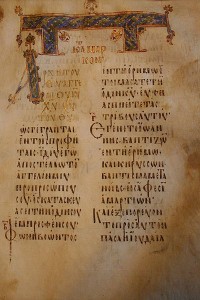Opposition to Christian Scriptures
While the benediction against the minim was certainly the most important step taken by the tannaim to combat Jewish Christianity, they also took steps to emphasize that the Christian Scriptures were not holy. First, the Jewish Christians themselves copied scrolls of the Bible (sifre minim). The question here was the sanctity of the entire text. Second, beginning in the second half of the first century, early recensions of the Gospels and Epistles began to circulate. The sanctity of those sections of these Christian texts that quoted the Hebrew Scriptures directly also had to be determined. In view of the role of the Gospels and Epistles as a vehicle for the dissemination of Christianity, it is easy to understand why the Rabbis went out of their way to divest them of sanctity and halakhic status.
T. Shabbat 13 (14):5 deals with these texts:
We do not save from a fire (on the Sabbath) the Gospels and the books of the minim (“heretics”). Rather, they are burned in their place, they and their Tetragrammata. Rabbi Yose HaGelili says: During the week, one should cut out their Tetragrammata and hide them away and burn the remainder. Said Rabbi Tarfon: May I bury my sons! If (these books) would come into my hand, I would burn them along with their Tetragrammata. For even if a pursuer were running after me, I would enter a house of idolatry rather than enter their (the Jewish Christians’) houses. For the idolaters do not know Him and deny Him, but these (Jewish Christians) know Him and deny Him…. Said Rabbi Ishmael: If in order to bring peace between a husband and his wife, the Everpresent has commanded that a book which has been written in holiness be erased by means of water, how much more so should the books of the minim which bring enmity between Israel and their Father Who is in Heaven be erased, they and their Tetragrammata…. Just as we do not save them from a fire, so we do not save them from a cavein nor from water nor from anything which would destroy them.
The passage contains no disagreement regarding what to do if the Gospels or other books of the minim (texts of the Hebrew Scriptures) are caught in a fire on the Sabbath. These books are not to be saved, as they have no sanctity. There is, however, debate regarding what to do with such texts during the week. Rabbi Yose HaGelili suggests removing the Tetragrammata and burning the rest. Apparently, he feels that regardless of who wrote it, the Tetragrammaton retains its sanctity. Rabbi Tarfon permits the burning of the texts with their divine names. Rabbi Ishmael agrees with Rabbi Tarfon and supports his view with an analogy to the bitter waters of the suspected adulteress. Further, Rabbi Tarfon regards these Jewish Christians as worse than idolaters, for while it was understandable that a pagan might embrace the new faith, it was a great source of frustration that Jews, raised in the traditions of Judaism, would do so as well.
In regard to dating, the named authorities in the debate are all Yavneans who flourished in the period leading up to the Bar Kokhba Revolt. We see that the Jewish Christians were using Hebrew texts of the Bible, and that there were early recensions of the Gospels already in circulation. A decision, therefore, had to be rendered regarding the halakhic status of these texts. This Tosefta passage is indicative of the emerging view of the tannaim. By this time, more and more Gentiles had joined the Church, and the Scriptures of the Christians had begun to be read in Palestine. The Rabbis had to take a stand indicating the heretical nature of these texts in the early years of the second century.
Further reference to the very same texts appears in T. Yadayim 2:l3:
The Gospels and the books of the minim (“heretics”) do not defile the hands….
The “defilement of the hands” was a sign of canonicity in tannaitic texts. Books of the Bible that defiled the hands were Holy Scriptures. In spite of the appearance of verses from the Hebrew Bible in the Gospels, this passage indicates that they, and even texts of the Hebrew Bible written by minim, have absolutely no sanctity.
While there is no indication of date in this passage, it seems that it would emerge from the same period as the previous text. Indeed, in the years before the Bar Kokhba Revolt, there was a need to accent the illegitimacy of Jewish Christianity. The two passages we have studied here indicate clearly that the transgressions of the minim were sufficient to render their texts of the Hebrew Bible unholy. The tannaim sought in this way to clearly differentiate Christianity from Judaism, but they did not attempt to disavow the Jewish status of the minim at any time.


I have been trying to understand this often quoted passage Shabbat 13:5-in which some say this is proof that the Tetragrammaton originally appeared in Christian New Testament writings–but was later removed. I’m not sure if this lends weight to the argument or if it is being misunderstood.
This quote is taken from Wikipedia—
“Laurence Schiffman[7] views this as a discussion of whether to rescue section of the sifre minim (Hebrew language texts of Jewish-Christians) containing the tetragrammata from a house fire. Another interpretation suggests this is a reference to Old Testament Torah and not the gospels.”
Where can I find more discussion of Professor Schiffmans view of this topic?
Thank you
Nick